Delivering Better Value in SEND
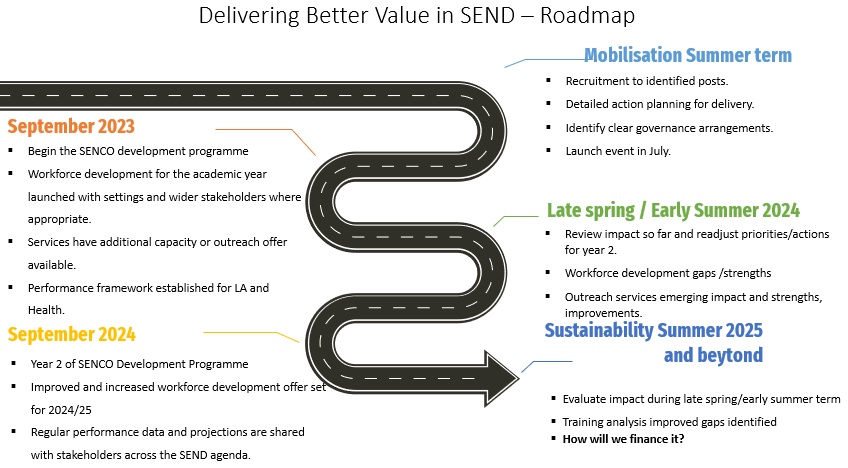
What is the Delivering Better Value in SEND (DBV) programme?
Delivering Better Value in SEND is about listening to families of children and young people with SEND and making improvements to what we offer.
55 areas have opted to participate and North East Lincolnshire was one of these.
We are being supported to identify the highest impact changes that can be put in place to improve outcomes for children and young people.
Our Local Authority has received one-off grant funding to be spent over two years.
The government have asked each local authority to be bold and think about new ways that money for SEND can be used. They have challenged authorities to spend money differently than we have in the past to try and get better outcomes.
They have called this ‘Delivering Better Value in SEND’- (DBV). About National DBV in SEND
How are we delivering better value?
The government asked local authorities to make sure we talk to children and young people with SEND and their families and really listen to their views. The Local Authority must also have good conversations with education settings and professionals from health and care who give support to children and young people with SEND.
The government have said local authorities must carefully look at data and information about:
- How many children and young people need support?
- How much support they need and from who?
- How much the support costs?
This information is then used to explore new ideas about support for SEND.
The first steps for DBV in North East Lincolnshire included gathering together a DBV team.
Overseeing the project is Rebecca Taylor (Head of SEND and Inclusion) who reports to the Senior Accountable Officer Sally Jack (Assistant Director Education & Inclusion). Victoria Birkwood is the Inclusion lead for DBV.
The DBV special projects lead Helen Norris is supported by project delivery manager Anita Havercroft and leads the team and the associated operational activities.
The Education Data Lead for the project is Linda Madley (Childrens Services Performance Analyst). Linda will also be supported by a newly created post of SEND data support officer.
Liz Brumer (Strategic lead for accountancy) is supported by Katie Smith in a newly created post of SEND finance support officer.
The SEND services manager Clare Linfitt works together with children and young people with SEND and their parents and carers and with Royce Coates (Communications Adviser of Special Projects) They are supported by SEND Local Offer Communications Officer Lauren Thompson.
Officers from education, procurement, legal services, educational psychology, the virtual school, social care, health, people and culture alongside representatives from mainstream and specialist education settings, Healthwatch, SENDIASS and North East Lincolnshire Parent carer forum are all working together as part of the team with regular governance in place.
You can also learn more about the different DBV workstreams by clicking on the tabs below.
- Operational Steering board including data and finance and inclusion workstreams
- DBV Communications Workstream Terms of Reference
The next step was analysing data, reviewing current practice and inviting stakeholders including parents and carers and young people with SEND and professionals from across education, health and social care to learn about the DBV programme and give their feedback on a range of key issues.
Themes from stakeholder workshops in February 2023 included:
- Listening and working together to improve provision
- Quality of EHCPs
- Waiting lists for teams/assessments/services
- Early Years – especially wider support for families
- Mental health
- Workforce development for TAs as well as teaching staff
- Work experience and Post 16
- Sufficiency of SEND places
Take a look at the feedback from schools and from parents and carers.
81 parent carers responded to the Delivering Better Value in SEND Survey released in November 2022.
1 in 8 Schools thought they did not have flexible policies, which was a large reason parents did not have confidence in mainstream settings.
The top 4 questions that both parent carers and schools disagreed on were:
- My school’s funding structure is incentivised to support inclusivity of children and young people with SEND.
- My school’s curriculum is well adapted.
- My school’s physical space is well adapted.
- My school has flexible policies (i.e. flexible uniform, school meals).
See here what pupils from our SEND Young People’s Advisory group had to say.
The next step was to create a plan to deliver the improvements across North East Lincolnshire and our local system to improve the outcomes and delivery of services for children and young people with SEND and their families.
For information on timescales for DBV in our local area, take a look at North East Lincolnshire’s DVB roadmap.

After looking at all the data and feedback NE Lincolnshire made a plan together with local parents carers, young people and professional from education, health and social care based on what they had found. It was decided that the three key themes for North East Lincs DBV project were:
Inclusion– working with schools and SENCos to help them improve their SEND knowledge and skills to best support children and young people with SEND who may or may not have an EHCP
Support for Speech, Language and Communication Needs
Support for professionals who are helping children and young people with Social Emotional and Mental Health needs (SEMH) and / or Autistic Spectrum Condition (ASC) and their families.
Resources
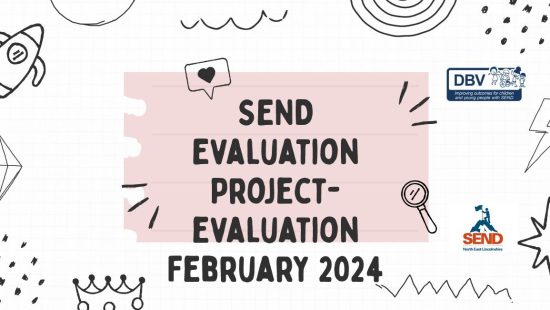
Working with you- What we’ve done so far
Please note that the comments are reflective of the workshops held in February 2023 as well as survey results from November 2022 as well. Voice was gathered from both education settings as well as parents, carers and families.
You said…..there are lots of questions and some confusion around EHCP targets.
- ‘Are they targets or outcomes?’
- ‘Is the way they are written preventing a child achieving realistic outcomes?’
- ‘Sometimes it looks as if a child isn’t making progress, but the target is often too big.’
What have we done through the DBV project?
We have started the roll out of the SMART Targets training for all settings and key practitioners to support skill development in effective outcomes descriptions, plans and target setting. This includes a toolkit that SENCOs and lead teachers can use to cascade the training to help support target writing pre-EHCP as well. There are a range of days, dates and times throughout the year that also include breakfast sessions that start before the school day as well as twilights that start after the end of the school day to try and accommodate all settings to support staff attendance.
You said…there are lots of challenges to secure the right qualified and skilled workforce to deliver effective interventions and provision.
- ‘No point using plans if there isn’t the staff to deliver it -needs to be linked to pay’
- ‘Specialist staff are needed and we don’t have them.’
- ‘I can’t recruit a TA with the right skills.’
- ‘Schools are not experts in SEMH.’
- ‘Waiting lists for services are too long. What do we do whilst we wait?’
- ‘We need a Whole school training programme’
What have we done through the DBV project?
During the Autumn term between October and Christmas, each mainstream school is undertaking a self-evaluation and then a day with a SEND consultant to help them evaluate SEND provision across their school. Through the results of this, the Local Authority will be able to identify with schools and Trusts the gaps and how DBV funding can be used to effectively commission further support or workforce development opportunities for school staff.
The intention is to launch a workforce development programme in January focussing on the specialist training already requested, followed by a SENCO specific offer based on the results of the evaluation. This may focus on more generalised themes, compared to the specialist training focussing on one of the four areas of need. Each school will need to identify which bits of the programme will be useful to support them on their SEND journey to enhance their graduated response.
You said….there aren’t enough specialists supporting children in schools and waiting lists are too long.
- ‘You haven’t replaced the specialist teachers that have left over the last year.’
- ‘There are no services that can help us when we need something more.’
- ‘Completing a referral leads to a waiting list, not support.’
What have we done through the DBV project?
We are in the process of commissioning an outreach service for neurodiverse needs, where education setting staff can make contact to seek advice and guidance. This will also include an offer of accredited training that all staff who work in Early Years settings, schools, Academies and Post 16 settings can access for free. Additional modules will be available which will require the setting to purchase them.
Starting on 1st September 2023, we commissioned a 1 year pilot project called ‘Springboard’. This was commissioned to support children aged up to 7 (end of key stage 1) to remain in their mainstream provision with specialist staff outreaching to the setting to work alongside a child’s existing staff team to demonstrate, model and provide resources on a try before you buy basis.
Additional capacity is currently being sourced from across the Yorkshire and Humber region to support children with Speech and Language needs who need assessing and follow up therapy.
You said…there aren’t enough places for children with EHCPs in North East Lincolnshire.
What have we done through the DBV project?
The DBV project will support the workforce development of upskilling staff who are already, or will be working within Resource Specialist provisions. The workforce development will run alongside the SEND capital projects programme which will see North East Lincolnshire open up to 60 more places in RSP across North East Lincolnshire covering a range of needs, and types of provision.
DBV Events
Special Educational Needs Coordinators (SENCo’s) from local schools met on Wednesday 6 December at Grimsby Town Hall to build on an ongoing piece of work to improve our offer for children and young people with Special Educational Needs and Disabilities (SEND).
Every setting now has an individual action plan encompassing all areas of SEND that they can execute in a targeted way to improve their offer. This creates a strong foundation for even more improvements going forward.
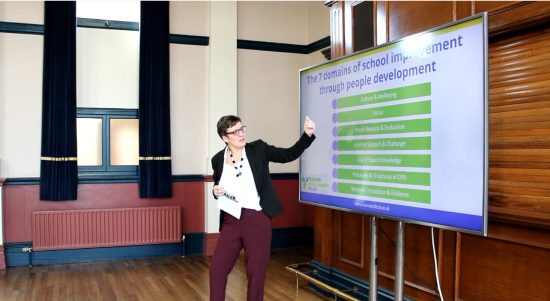
Read the full article: NELC SEND Local Offer | Schools collaborate to improve offer for special educational needs and disabilities (SEND) – NELC SEND Local Offer (nelincs.gov.uk)
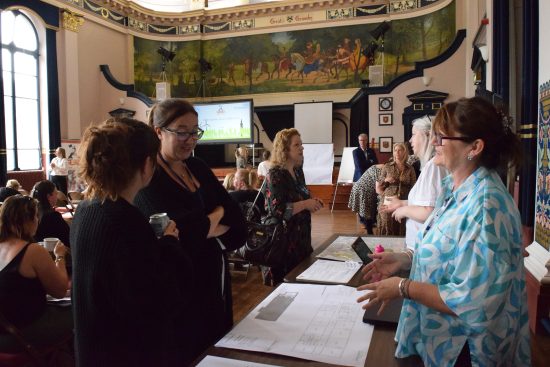
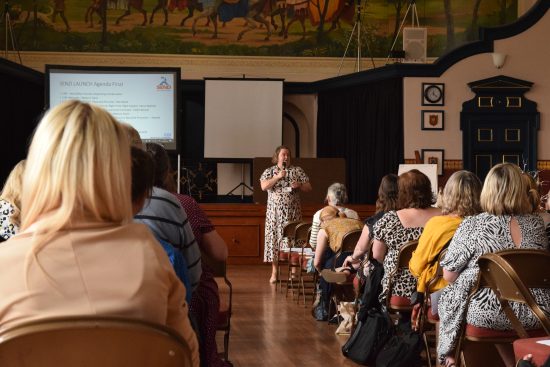
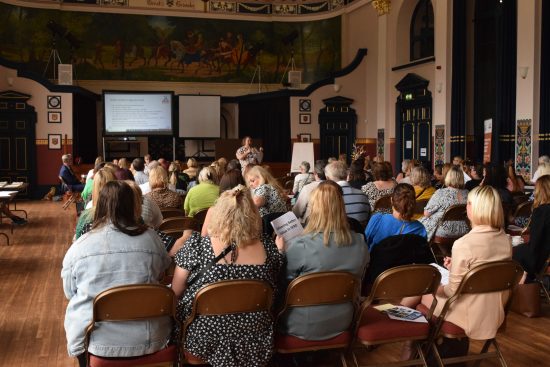
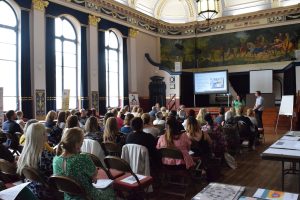
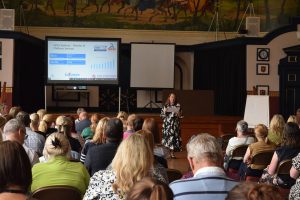
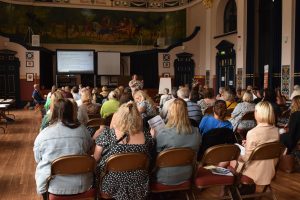



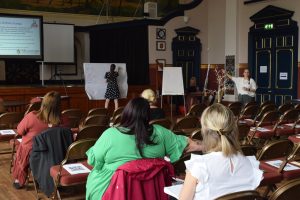
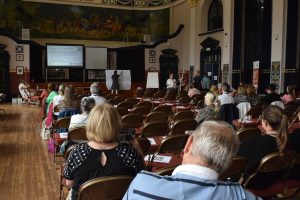
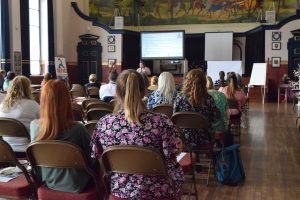
The Delivering Better Value (DBV) in Special educational needs and disabilities (SEND) launch was held on 12 July at Grimsby Town Hall. The event was attended by representatives from schools and providers across North East Lincolnshire. Presentations were given by Rob Walsh, (Chief Executive of the Council and ICB) Helen Kenyon, Janice Spencer, (Director of Children’s Services) Rebecca Taylor (Head of SEND and Inclusion) and Nev Wilkinson (Headteacher at Littlecoates Primary School) who collaboratively delivered the key messages within this article.
DBV in SEND is an important part of transforming the support that our children and young people with additional needs can receive in North East Lincolnshire. Nationally, the Children’s Commissioner for England, Dame Rachel de Souza, has expressed her concerns about lack of support for children with Special Educational Needs in mainstream education and long waiting times for EHCPs as demand reaches new highs. In June of this year she has published a report calling for a ‘radical rehaul of the SEND system’ and ‘swift implementation of the SEND Improvement Plan’. The full report can be found here.
Latest Department for Education statistics shows that almost 400,000 children are in receipt of an EHCP – up 9.5% from 2022 and nearly 1.2 million children in England have special educational needs support without an EHCP – up 4.7% from 2022.
The North East Lincolnshire (NEL) picture is no different – locally NEL have nearly 1400 children with EHCPs, and a further 3,200 children receiving support in their education settings. The number of Education, Health, and Care Assessment Requests (EHCAR) received in North East Lincolnshire have increased each month over the last academic year
Partnership working is crucial to transforming support available to our children and young people across the borough. Health and Education are working together to increase capacity in speech and language for two years to support bringing waiting list times down alongside developing capacity in schools through training on the ELKLAN practitioners’ course to deliver targeted speech interventions. This is happening alongside another project that has already rolled out the WELCOMM toolkit to all of the Early Years settings in the borough.
Other major projects running alongside the Delivering Better Value in SEND project, include a 150 place Social, Emotional and Mental Health (SEMH) special school and additional places in resource specialist provision. Our ambition is to develop up to 60 Primary places across the borough Our first Primary provision at Littlecoates Academy opened at Easter with six places for children in KS1, a further six places will be available from September 2023.
Based on the differing perceptions of inclusion between education settings, and families, it is crucial that each education setting understands their own baseline of where they are at with their SEND provision. In September, the main programme of activity to Deliver Better Value in SEND will kick off with the launch of a SEND evaluation. Each of our sixty mainstream schools and post sixteen colleges will benefit from a day of a specialist SEND consultant to help them evaluate their setting and create an action plan for development. With a common and comprehensive understanding of the strengths and areas for development in each setting, the DBV steering group will then be able to identify and suggest additional training and support that can be commissioned from January 2024.
Workforce development opportunities are advertised on the NEL SEND Local Offer and starting from the Autumn Term will include:
- Autism Education Trust modules
- ELKLAN practitioner training
- BUSS model introductory training
- Trauma informed practitioner training
- IPSEA SEND legal training
- SMART targets workshop
- Open afternoon events in our special and alternative settings
- SENCo Forum
The NELC DBV project is being delivered from 01/04/23 to August 2025 If you require any further information or have a question for the project team, please don’t hesitate to contact the project manager , Anita.havercroft@nelincs.gov.uk.
